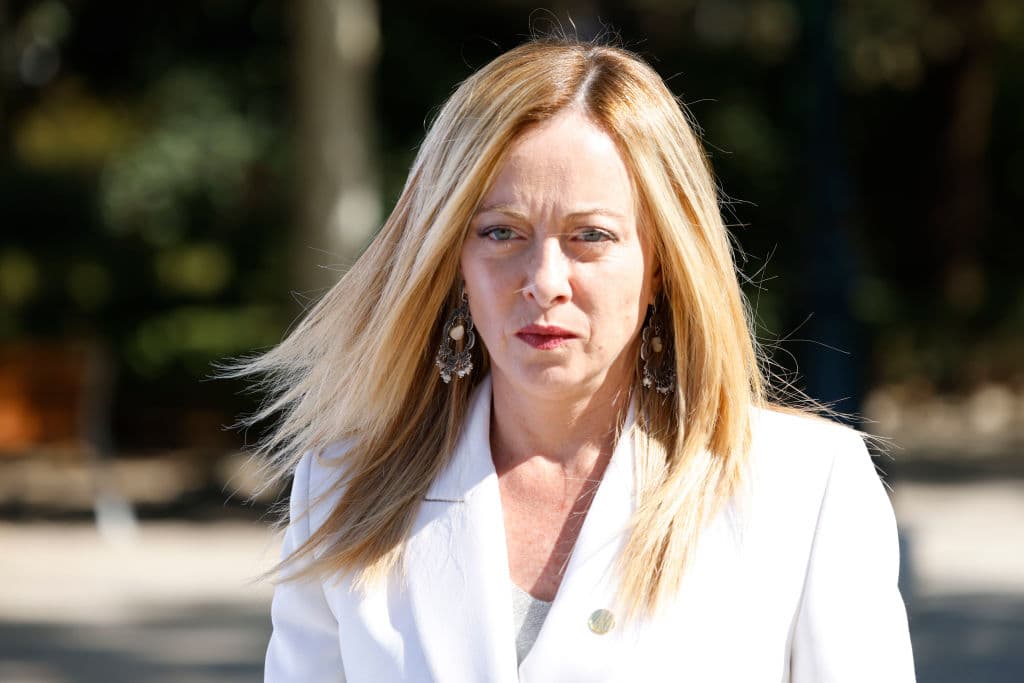As Italy’s Deep State Comes for Giorgia Meloni, the Doughty Prime Minister Eyes a Queen’s Gambit
A possible debt downgrade looms while the permanent unelected political establishment tries to overturn the results of the last election.

With bond rating agencies slated to issue their credit assessments of Italy in the coming weeks, the fear is that the country’s debt could fall into the junk bond category. This would be a major blow to Prime Minister Meloni. It also raises concerns that her opponents — a kind of Deep State, Italian Style — will use a downgrade as a pretext for a technocratic power grab.
More than any other G-7 power, Italy is saddled with an unelected sub-rosa political establishment that cares not a whit about the will of the people. Even though Signora Meloni’s administration has been in office but a year, this shadow government is rearing its head yet again. Unable to bear a strong center-right government, they seek to overturn the results of last year’s election. A downgrade could prove a moment to strike.
Neither a cabal nor a conspiracy, the Italian deep state is a default setting of sorts. It allows the President to appoint a government of technocrats in times of crisis. Yet this mechanism has been abused in the past, running roughshod over the democratic process. Though Italy faces considerable economic and geopolitical challenges, it is not now in dire straits.
It isn’t the fear of a downgrade that motivates Signora Meloni’s opponents. Theirs is an ideological antipathy. Yet she is one step ahead of the usual suspects. She is well aware that members of Elly Schlein’s left-wing Partito Democratico, Giuseppe Conte’s populist Cinque Stelle, or Five Star Movement, and Matteo Renzi’s center-left Italia Viva parties are among those agitating for a return of the technocrats.
Ms. Schlein has claimed that in promulgating a decree curbing illegal migration, the Meloni government is “waging war on NGOs that is only making up for the serious absence of an institutional EU search and rescue mission in the Mediterranean.” In other words: call in the technocrats who disdain Italian sovereignty but defer to Brussels.
And Ms. Schlein’s charge that Ms. Meloni’s dawdling would cost Italy its allotment under the EU’s Recovery and Resilience Plan proved to be a false alarm. On October 9, the European Commission announced that Italy had met all the conditions for receiving its third installment — 18.5 billion euros— of the pandemic recovery funds. In a rebuke to the naysayers, the Prime Minister exclaimed: “This nation believes in itself again.”
While attending the Euro Med 9 meeting in Malta recently, Ms. Meloni criticized those who believe that “a democratically elected working government that is stable and enjoys a strong majority should go home in favor of a government that no one elected.” She quipped that her critics have already compiled a list of prospective cabinet ministers in the next technocratic government. Such a tactic is as brazen as it is, well, unpatriotic.
Under the guise of concern for the well-being of the nation, the deep statists are undermining Italy’s duly elected rightist government. They are, of course, aided and abetted by the press. In a recent interview with the Guardian, Luisa Rizzitelli, a feminist and gay rights activist, depicted Ms. Meloni as an astute yet duplicitous political chameleon who is “more like a soft right-winger” with “the power to influence public opinion over policies which are really dangerous.”
The president of Emilio-Romagna, Stefano Bonaccini, sees a danger in what he perceives as Ms. Meloni’s authoritarian demeanor, citing unnamed sources who fear that the Premier and her coalition are attempting to seize control of Italy’s national broadcasting company and “change the narrative to their way of thinking.”
Yet Mr. Bonaccini should know that elections do have consequences. Both Rizzitelli and Bonaccini believe that Ms. Meloni is disingenuous when it comes to relations with the EU, Ukraine, and outreach to Africa. However, according to a senior fellow at the American Enterprise Institute, Elisabeth Braw, the Prime Minister is engaged in a sophisticated problem-solving gambit that links the geopolitical, economic and social realms.
Ms. Braw compares Signora Meloni’s stratagem to the Queen’s Gambit — “an ingenious opening in three parts” — pioneered by the legendary 17th-century chess player Gioacchino Greco. Known as il Calabrese — for the Italian region of his birth — Greco also penned the world’s first chess handbook. Ms. Braw explains that Signora Meloni “is about to launch a Queen’s Gambit of her own,” in the sphere of foreign policy.
Ms. Meloni’s gambit eyes expanding energy production in Northern Africa and “aims to turn Italy into a major energy hub,” Reuters reports, “distributing gas from North Africa and the Mediterranean to the rest of Europe.” In chess, such a gambetto happens on the left side of the board, where the queen’s piece is dominant.
However, it is the center-right Italian premier who sees a strategic advantage stemming from, she says, “our geographical position and the leadership that companies such as Eni,” the Italian energy giant, “have been able to build.” In addition to reducing European dependence on Russian energy, Ms. Meloni’s plan would be a boon for North Africa and the Middle East.
Improving conditions in those regions would reduce the flow of illegal migrants, enhance European stability, promote Italian diplomatic influence — and even accelerate the pace of economic growth. That’s especially important in light of the sobering revisions in the Treasury’s September 27 economic appraisal. Italy’s GDP is now expected to rise by only 0.8 percent this year, and 2024’s growth target was lowered to 1.2 percent from 1.5 percent.
The economy minister, Giancarlo Giorgetti, tied the change in outlook to the European Central Bank’s “restrictive monetary policy and the war in Ukraine.” The slowdown was compounded by the costly tax credit for energy-saving home improvements enacted by the former Conte administration. It all serves to underscore the need for Prime Minister Meloni to pursue il Gambetto di Regina — con brio.

